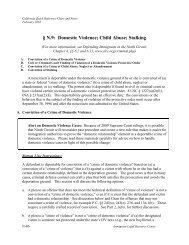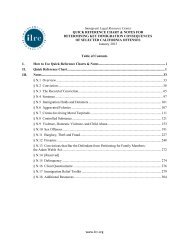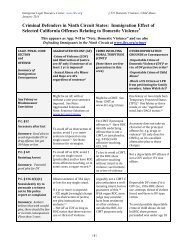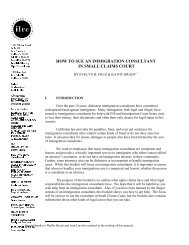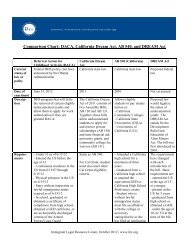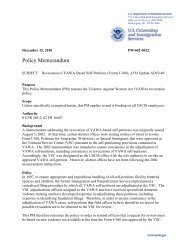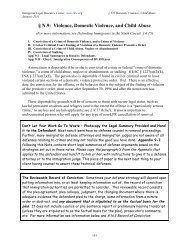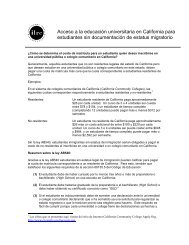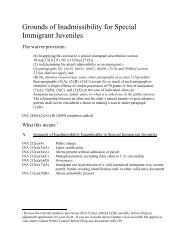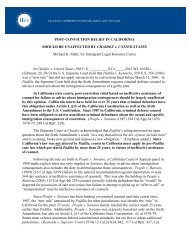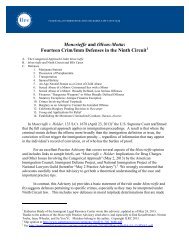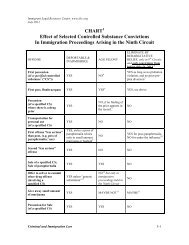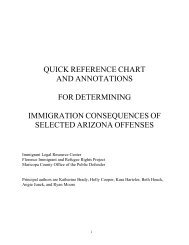quick reference chart and notes for determining immigration - ILRC
quick reference chart and notes for determining immigration - ILRC
quick reference chart and notes for determining immigration - ILRC
You also want an ePaper? Increase the reach of your titles
YUMPU automatically turns print PDFs into web optimized ePapers that Google loves.
Cali<strong>for</strong>nia Quick Reference Chart <strong>and</strong> Notes<br />
February 2010<br />
For the Defendant: Annoying or molesting a child under P.C. § 647.6(a) is not categorically an<br />
aggravated felony as sexual abuse of a minor. United States v. Pallares-Galan, 359 F.3d 1088<br />
(9 th Cir. 2004).<br />
The Ninth Circuit found that § 647.6(a) is not categorically a crime involving moral turpitude,<br />
because it encompasses mild <strong>and</strong> non-harmful behavior coupled with a broad mens rea<br />
requirement. Nicanor-Romero v. Mukasey, 523 F.3d 992, 1000-1003 (9 th Cir. 2008). The Court<br />
en banc partially overruled Nicanor-Romero, but only to the extent that Nicanor-Romero stated<br />
in general that the BIA’s moral turpitude determinations are not governed by the traditional<br />
principles of administrative deference; it did not overturn the Nicanor-Romero holding<br />
regarding § 647.6(a). Marmolejo-Campos v. Holder, 558 F.3d 903, 911 (9 th Cir. 2009) (en<br />
banc). There is no published administrative decision regarding § 647.6(a).<br />
Adam Walsh Act bar to immigrating family members. While this offense may<br />
involve very mild misconduct, it is possible that conviction will bar a U.S. citizen or permanent<br />
resident from being able to file a family visa petition to get lawful <strong>immigration</strong> status <strong>for</strong> a close<br />
relative in the future. See further discussion at Note 11, supra.<br />
4. Simple battery, spousal battery, PC §§ 243(a), 243(e)<br />
A statute that can be violated by “mere offensive touching” is not a crime of violence<br />
under 18 USC § 16, at least absent evidence in the record of conviction that actual violence was<br />
involved. Counsel should identify “mere offensive touching” in the record, or if that is not<br />
possible leave the record vague as to level of violence.<br />
For the Defendant: Misdemeanor Cali<strong>for</strong>nia battery, including battery against a spouse, under<br />
Calif. PC §§ 242, 243(a), 243(e) is not categorically a crime of violence, nor a crime involving<br />
moral turpitude. Ortega-Mendez v. Gonzales, 450 F.3d 1010 (9 th Cir. 2006) (P.C. § 242 is not a<br />
crime of violence or a domestic violence offense); Matter of Sanudo, 23 I&N Dec. 968 (BIA<br />
2006) (Calif. PC §§ 242, 243(e) is not categorically a crime of violence, a crime of domestic<br />
violence or a crime involving moral turpitude).<br />
The BIA has held that simple battery <strong>and</strong> spousal battery are not crimes involving moral<br />
turpitude where the offense is committed with mere offensive touching. Under Matter of Silva-<br />
Trevino, an <strong>immigration</strong> judge may go beyond the record of conviction if the record does not<br />
establish whether the offense involves moral turpitude. The best strategy to prevent this is to<br />
plead specifically to conduct that does not constitute a CMT, which here is a mere offensive<br />
touching. See § N.7 Crimes Involving Moral Turpitude.<br />
In contrast, counsel should assume that P.C. § 273.5 will be held a crime of violence <strong>and</strong> a<br />
crime of domestic violence. The Ninth Circuit held that it is not categorically a crime involving<br />
Immigrant Legal Resource Center N-127



